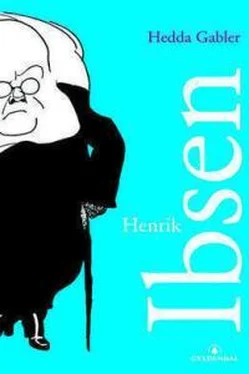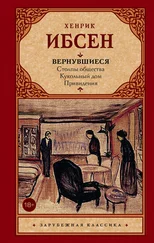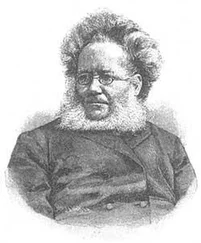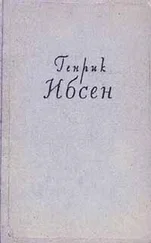Генрик Ибсен - Hedda Gabler
Здесь есть возможность читать онлайн «Генрик Ибсен - Hedda Gabler» весь текст электронной книги совершенно бесплатно (целиком полную версию без сокращений). В некоторых случаях можно слушать аудио, скачать через торрент в формате fb2 и присутствует краткое содержание. Год выпуска: 2014, Издательство: epubBooks Classics, Жанр: Драматургия, на английском языке. Описание произведения, (предисловие) а так же отзывы посетителей доступны на портале библиотеки ЛибКат.
- Название:Hedda Gabler
- Автор:
- Издательство:epubBooks Classics
- Жанр:
- Год:2014
- ISBN:нет данных
- Рейтинг книги:3 / 5. Голосов: 1
-
Избранное:Добавить в избранное
- Отзывы:
-
Ваша оценка:
- 60
- 1
- 2
- 3
- 4
- 5
Hedda Gabler: краткое содержание, описание и аннотация
Предлагаем к чтению аннотацию, описание, краткое содержание или предисловие (зависит от того, что написал сам автор книги «Hedda Gabler»). Если вы не нашли необходимую информацию о книге — напишите в комментариях, мы постараемся отыскать её.
Hedda Gabler — читать онлайн бесплатно полную книгу (весь текст) целиком
Ниже представлен текст книги, разбитый по страницам. Система сохранения места последней прочитанной страницы, позволяет с удобством читать онлайн бесплатно книгу «Hedda Gabler», без необходимости каждый раз заново искать на чём Вы остановились. Поставьте закладку, и сможете в любой момент перейти на страницу, на которой закончили чтение.
Интервал:
Закладка:
We cannot point to any individual model or models who "sat to" Ibsen for the character of Hedda. [5] Dr. Brahm ( Neue deutsche Rundschau , December 1906, P. 1422) says that after the first performance of Hedda Gabler in Berlin Ibsen confided to him that the character had been suggested by a German lady whom he met in Munich, and who did not shoot, but poisoned herself. Nothing more seems to be known of this lady. See, too, an article by Julius Elias in the same magazine, p. 1460.
The late Grant Allen declared that Hedda was "nothing more nor less than the girl we take down to dinner in London nineteen times out of twenty"; in which case Ibsen must have suffered from a superfluidity of models, rather than from any difficulty in finding one. But the fact is that in this, as in all other instances, the word "model" must be taken in a very different sense from that in which it is commonly used in painting. Ibsen undoubtedly used models for this trait and that, but never for a whole figure. If his characters can be called portraits at all, they are composite portraits. Even when it seems pretty clear that the initial impulse towards the creation of a particular character came from some individual, the original figure is entirely transmuted in the process of harmonisation with the dramatic scheme. We need not, therefore, look for a definite prototype of Hedda; but Dr. Brandes shows that two of that lady's exploits were probably suggested by the anecdotic history of the day.
Ibsen had no doubt heard how the wife of a well–known Norwegian composer, in a fit of raging jealousy excited by her husband's prolonged absence from home, burnt the manuscript of a symphony which he had just finished. The circumstances under which Hedda burns Lovborg's manuscript are, of course, entirely different and infinitely more dramatic; but here we have merely another instance of the dramatisation or "poetisation" of the raw material of life. Again, a still more painful incident probably came to his knowledge about the same time. A beautiful and very intellectual woman was married to a well–known man who had been addicted to drink, but had entirely conquered the vice. One day a mad whim seized her to put his self–mastery and her power over him to the test. As it happened to be his birthday, she rolled into his study a small keg of brandy, and then withdrew. She returned some time after wards to find that he had broached the keg, and lay insensible on the floor. In this anecdote we cannot but recognise the germ, not only of Hedda's temptation of Lovborg, but of a large part of her character.
"Thus," says Dr. Brandes, "out of small and scattered traits of reality Ibsen fashioned his close–knit and profoundly thought–out works of art."
For the character of Eilert Lovborg, again, Ibsen seem unquestionably to have borrowed several traits from a definite original. A young Danish man of letters, whom Dr. Brandes calls Holm, was an enthusiastic admirer of Ibsen, and came to be on very friendly terms with him. One day Ibsen was astonished to receive, in Munich, a parcel addressed from Berlin by this young man, containing, without a word of explanation, a packet of his (Ibsen's) letters, and a photograph which he had presented to Holm. Ibsen brooded and brooded over the incident, and at last came to the conclusion that the young man had intended to return her letters and photograph to a young lady to whom he was known to be attached, and had in a fit of aberration mixed up the two objects of his worship. Some time after, Holm appeared at Ibsen's rooms. He talked quite rationally, but professed to have no knowledge whatever of the letter–incident, though he admitted the truth of Ibsen's conjecture that the "belle dame sans merci" had demanded the return of her letters and portrait. Ibsen was determined to get at the root of the mystery; and a little inquiry into his young friend's habits revealed the fact that he broke his fast on a bottle of port wine, consumed a bottle of Rhine wine at lunch, of Burgundy at dinner, and finished off the evening with one or two more bottles of port. Then he heard, too, how, in the course of a night's carouse, Holm had lost the manuscript of a book; and in these traits he saw the outline of the figure of Eilert Lovborg.
Some time elapsed, and again Ibsen received a postal packet from Holm. This one contained his will, in which Ibsen figured as his residuary legatee. But many other legatees were mentioned in the instrument—all of them ladies, such as Fraulein Alma Rothbart, of Bremen, and Fraulein Elise Kraushaar, of Berlin. The bequests to these meritorious spinsters were so generous that their sum considerably exceeded the amount of the testator's property. Ibsen gently but firmly declined the proffered inheritance; but Holm's will no doubt suggested to him the figure of that red–haired "Mademoiselle Diana," who is heard of but not seen in Hedda Gabler , and enabled him to add some further traits to the portraiture of Lovborg. When the play appeared, Holm recognised himself with glee in the character of the bibulous man of letters, and thereafter adopted "Eilert Lovborg" as his pseudonym. I do not, therefore, see why Dr. Brandes should suppress his real name; but I willingly imitate him in erring on the side of discretion. The poor fellow died several years ago.
Some critics have been greatly troubled as to the precise meaning of Hedda's fantastic vision of Lovborg "with vine–leaves in his hair." Surely this is a very obvious image or symbol of the beautiful, the ideal, aspect of bacchic elation and revelry. Antique art, or I am much mistaken, shows us many figures of Dionysus himself and his followers with vine–leaves entwined their hair. To Ibsen's mind, at any rate, the image had long been familiar. In Peer Gynt (Act iv. sc. 8), when Peer, having carried off Anitra, finds himself in a particularly festive mood, he cries: "Were there vine–leaves around, I would garland my brow." Again, in Emperor and Galilean (Pt. ii. Act 1) where Julian, in the procession of Dionysus, impersonates the god himself, it is directed that he shall wear a wreath of vine–leaves. Professor Dietrichson relates that among the young artists whose society Ibsen frequented during his first years in Rome, it was customary, at their little festivals, for the revellers to deck themselves in this fashion. But the image is so obvious that there is no need to trace it to any personal experience. The attempt to place Hedda's vine–leaves among Ibsen's obscurities is an example of the firm resolution not to understand which animated the criticism of the 'nineties.
Dr. Brandes has dealt very severely with the character of Eilert Lovborg, alleging that we cannot believe in the genius attributed to him. But where is he described as a genius? The poet represents him as a very able student of sociology; but that is quite a different thing from attributing to him such genius as must necessarily shine forth in every word he utters. Dr. Brandes, indeed, declines to believe even in his ability as a sociologist, on the ground that it is idle to write about the social development of the future. "To our prosaic minds," he says, "it may seem as if the most sensible utterance on the subject is that of the fool of the play: 'The future! Good heavens, we know nothing of the future.'" The best retort to this criticism is that which Eilert himself makes: "There's a thing or two to be said about it all the same." The intelligent forecasting of the future (as Mr. H. G. Wells has shown) is not only clearly distinguishable from fantastic Utopianism, but is indispensable to any large statesmanship or enlightened social activity. With very real and very great respect for Dr. Brandes, I cannot think that he has been fortunate in his treatment of Lovborg's character. It has been represented as an absurdity that he would think of reading abstracts from his new book to a man like Tesman, whom he despises. But though Tesman is a ninny, he is, as Hedda says, a "specialist"—he is a competent, plodding student of his subject. Lovborg may quite naturally wish to see how his new method, or his excursion into a new field, strikes the average scholar of the Tesman type. He is, in fact, "trying it on the dog"—neither an unreasonable nor an unusual proceeding. There is, no doubt, a certain improbability in the way in which Lovborg is represented as carrying his manuscript around, and especially in Mrs. Elvsted's production of his rough draft from her pocket; but these are mechanical trifles, on which only a niggling criticism would dream of laying stress.
Читать дальшеИнтервал:
Закладка:
Похожие книги на «Hedda Gabler»
Представляем Вашему вниманию похожие книги на «Hedda Gabler» списком для выбора. Мы отобрали схожую по названию и смыслу литературу в надежде предоставить читателям больше вариантов отыскать новые, интересные, ещё непрочитанные произведения.
Обсуждение, отзывы о книге «Hedda Gabler» и просто собственные мнения читателей. Оставьте ваши комментарии, напишите, что Вы думаете о произведении, его смысле или главных героях. Укажите что конкретно понравилось, а что нет, и почему Вы так считаете.









